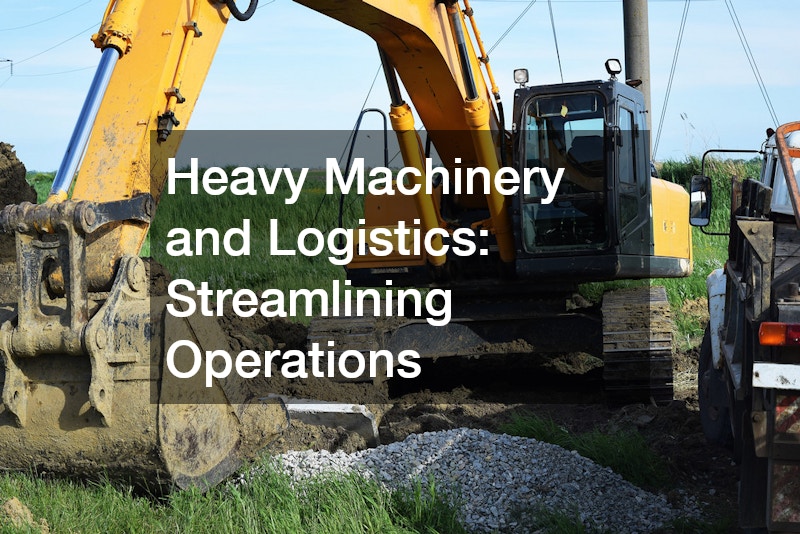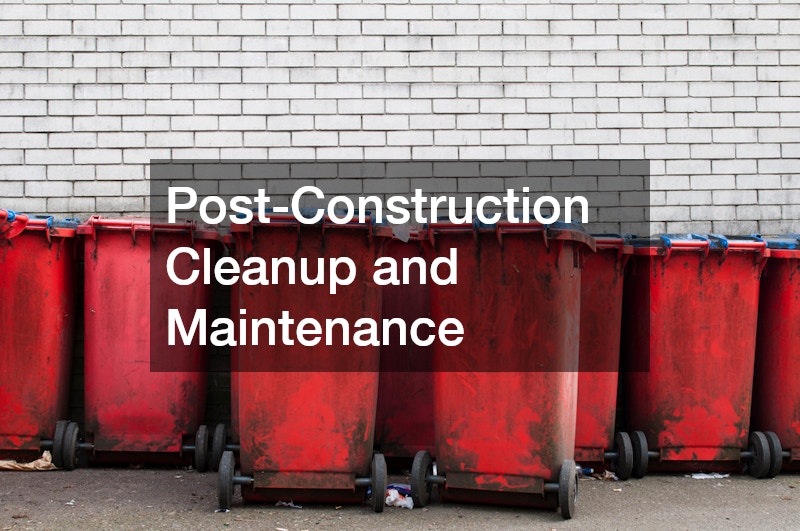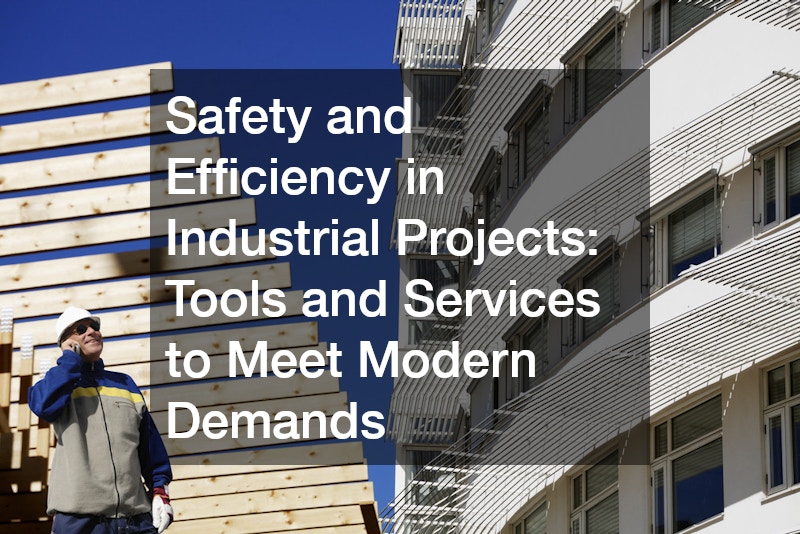Industrial project management has reached new heights of complexity, necessitating advanced strategies to cope with increasing demands for safety and efficiency. The intricacy of modern projects requires not only an understanding of technical specifications but also a coherent approach to managing diverse and often concurrent operations.
Ensuring that industrial projects meet contemporary industry standards involves integrating reliable tools and professional services seamlessly. This approach aids in upholding safety, maintaining efficiency, and achieving sustainability, contributing significantly to the project’s success.
The purpose of this article is to delve into the essential tools and professional services pivotal for enhancing the outcomes of industrial project management. By examining these elements, the article aims to guide businesses in prioritizing necessary resources for optimal results.
Laying the Foundation: Pre-Construction Services

A solid foundation is crucial for any industrial or commercial project, and this starts with meticulous pre-construction planning. Site analysis is the first step, where professionals evaluate environmental factors, soil conditions, and regulatory compliance to ensure project feasibility. Engineering companies provide detailed assessments and collaborate with architecture firms to design innovative yet practical structures that meet aesthetic and functional goals.
Excavating contractors prepare the site for construction by clearing land, digging foundations, and addressing drainage requirements. This groundwork ensures stability and prevents issues like uneven settling. Pre-construction services streamline the transition to the building phase, minimizing delays and costs. By investing in professional planning and preparation, businesses set the stage for projects that are both safe and efficient.
Site Analysis and Planning
Expert professionals play a critical role in site analysis and planning, ensuring that projects comply with safety regulations and environmental standards. Their involvement ensures that the groundwork for industrial project management is laid effectively from the start.
Engineering companies contribute to pre-construction phases by delivering precise calculations, guaranteeing structural integrity, and addressing potential problems before they arise. Such foresight reduces risks and enhances the feasibility of complex industrial projects.
Design and Architecture
Partnering with a reputable architecture firm ensures that tailored and sustainable designs align with the project’s goals. This collaborative approach facilitates a balance between aesthetics, functionality, and environmental considerations.
The synergy between architects, engineers, and contractors is essential in aligning the vision and the technical specifications of a project. This collaboration underpins effective industrial project management by adopting a cohesive and structured planning approach.
Excavation and Site Preparation
Excavating contractors are vital in preparing sites for construction, thereby influencing the entire project’s timeline. Their expertise ensures that sites are primed and ready, minimizing delays and maximizing foundational stability from the onset.
Proper excavation impacts not only the project’s schedule but also the stability and integrity of the entire structural build. As part of industrial project management, effective site preparation is non-negotiable for ensuring robustness and durability.
Heavy Machinery and Logistics: Streamlining Operations

Efficient heavy machinery and logistics services are essential for the seamless execution of industrial projects. Access to equipment like excavators through flexible rental options allows businesses to scale operations based on project demands without incurring high ownership costs. Excavator rentals provide reliable, well-maintained machinery for tasks like digging, grading, and site preparation.
Equally important is heavy equipment hauling, which ensures safe and timely transportation of oversized machinery and materials. Professional hauling services manage logistics efficiently, reducing delays and preventing damage during transit.
By leveraging these services, businesses can optimize resource allocation, minimize downtime, and maintain project timelines. Effective coordination between equipment providers and logistics experts plays a key role in enhancing operational efficiency and achieving project success.
Equipment Rentals for Flexibility
Excavator rentals offer a flexible and cost-effective solution, allowing projects to access heavy machinery without long-term investment. This is particularly advantageous for managing transient needs within industrial project management.
Choosing reliable rental services involves considering the specific requirements of a project, ensuring that equipment provided is both suitable and well-maintained. This strategic choice can influence overall project efficiency and effectiveness.
Transport and Hauling Services
Heavy equipment hauling solutions are crucial for ensuring the safe and efficient transport of machinery and materials across project sites. Careful planning in logistics can prevent delays and optimize resource allocation in industrial project management.
Effective logistics enhance the seamless progress of industrial projects by coordinating transport phases with construction timelines. This integrated approach contributes to maintaining momentum and reducing bottlenecks throughout the project’s lifespan.
Building Structures: Precision and Safety
Constructing durable and efficient structures is essential for industrial and commercial projects. Commercial roofing ensures protection from harsh environmental elements, enhancing energy efficiency and structural stability. Partnering with experienced roofing professionals guarantees high-quality installation and maintenance, preventing costly repairs over time.
For precise manufacturing of structural components, CNC machine services are indispensable. These services provide accuracy and consistency, producing parts that meet exact specifications. By minimizing material waste and errors, CNC machining ensures that projects maintain high standards of quality and safety. Together, these solutions establish a foundation for reliable, long-lasting structures tailored to modern business needs.
Roofing and Structural Stability
In industrial projects, commercial roofing requires careful consideration for its role in ensuring structural stability and protection from environmental elements. Durability and insulation are key factors in determining the suitability of roofing materials.
Quality commercial roofing solutions provide long-term benefits, enhancing safety and cost-efficiency and reducing maintenance demands. This contributes significantly to the sustainability of both the infrastructure and the broader industrial project.
Precision Manufacturing for Components
CNC machine services offer unparalleled precision in manufacturing customized components for industrial projects. Their use minimizes errors, ensuring efficiency and reducing material waste within project specifications.
Utilizing CNC machine services in industrial project management elevates project quality by ensuring that every component adheres to exacting standards. This level of precision is particularly important in maintaining the integrity of the projects and their operations.
Safety First: Ensuring Compliance and Risk Mitigation
Safety is paramount in industrial projects, where risks can impact workers, timelines, and costs. Implementing OSHA-compliant fall protection solutions is a critical step to safeguard employees working at heights. These systems, including harnesses and guardrails, reduce accidents and ensure legal compliance.
Engineering companies play a vital role in assessing risks and designing solutions tailored to project needs. Regular safety training empowers workers to handle equipment responsibly and adhere to safety protocols. By prioritizing compliance and risk mitigation, businesses create secure environments that enhance productivity, protect resources, and foster trust among stakeholders, ultimately ensuring long-term operational success.
Workplace Safety Standards
Implementing OSHA compliant fall protection solutions is essential for preventing workplace accidents and safeguarding workers. When incorporated throughout industrial project management, these solutions ensure a safer working environment.
Industrial projects are enriched by detailed safety measures, such as guardrails, harnesses, and strict inspection protocols. These elements are foundational to maintaining compliance with safety standards within each project.
Professional Oversight and Training
Engaging engineering companies for safety assessments and oversight provides invaluable guidance throughout an industrial project’s lifecycle. Their expertise ensures adherence to safety standards and the mitigation of potential risks.
Comprehensive training programs equip employees with the knowledge and skills needed to understand and implement safety practices. This empowers teams to actively contribute to minimizing hazards during projects.
Post-Construction Cleanup and Maintenance

After completing an industrial project, proper cleanup and maintenance are crucial to ensure a seamless transition into operational use. Debris management is a key component, and dumpster rental services provide efficient solutions for collecting and disposing of construction waste. These services keep the site organized and environmentally compliant.
In addition, final cleaning touches by commercial carpet cleaning companies help restore the site’s professional appearance. Removing construction dust, stains, and debris enhances the overall environment and ensures readiness for employees and clients.
Routine maintenance, such as inspections and touch-ups, should also follow. These efforts extend the lifespan of facility elements and uphold safety standards, ensuring long-term usability and a polished image for the business or facility.
Debris Management and Waste Disposal
Dumpster rental services play a crucial role in simplifying the collection and disposal of debris post-construction. They streamline waste management, ensuring that industrial project sites remain organized and efficient.
Eco-friendly waste management practices contribute to regulatory compliance and project sustainability. Sustainable practices in industrial project management extend the environmental responsibilities beyond the construction phase.
Final Touches: Cleaning Services
Engaging commercial carpet cleaning companies as part of post-construction processes ensures a clean and professional finish. Cleaning services contribute to quality control, presenting a polished environment prior to project handover.
Comprehensive cleaning services facilitate a smooth transition from construction to operation, adding to the finesse of industrial project management. This final step solidifies the overall quality and presentation of a completed project.
Enhancing Project Efficiency with Expert Collaboration

Effective collaboration among key stakeholders is essential for successful industrial and commercial projects. Architects, engineers, and contractors must work together seamlessly to ensure all aspects of the project align and progress efficiently. Open communication channels and regular updates help address potential challenges promptly, preventing costly delays.
Utilizing advanced project management tools can further streamline coordination, offering real-time updates and task tracking to keep everyone informed. These tools improve transparency, enhance accountability, and ensure resources are allocated effectively.
Moreover, leveraging the expertise of specialized service providers—such as CNC machining services or safety compliance advisors—adds precision and quality to the project. By fostering a collaborative and technology-driven approach, businesses can achieve superior outcomes while maintaining timelines and budgets.
Team Coordination and Communication
The coordination among architecture firms, engineering teams, and contractors is vital for seamless industrial project execution. Each party’s input and expertise are crucial for achieving the project’s goals within set timelines.
Aligning objectives and timelines ensures that industrial projects remain on track, maintaining momentum and optimizing efficiency. Such coordination is foundational for minimizing disruptions and fostering robust industrial project management.
Leveraging Technology for Better Outcomes
Innovative technologies, including CNC machines and automated safety tools, are instrumental in boosting efficiency within project parameters. These advancements streamline processes, enhancing productivity across industrial project management domains.
Examples of technological innovation reflect how projects can leverage new tools for improved execution and management. By adopting advanced tools, projects can achieve higher levels of precision, safety, and accountability.
Long-Term Maintenance and Sustainability

Long-term maintenance and sustainable practices are essential for the longevity and efficiency of industrial and commercial operations. Regular upkeep of key infrastructure, such as commercial roofing and safety systems, ensures reliability while preventing costly repairs. Scheduling periodic inspections and addressing minor issues early can significantly extend the lifespan of facilities and equipment.
Sustainability plays a growing role in modern projects. Integrating energy-efficient solutions like advanced insulation, renewable energy systems, and eco-friendly materials reduces environmental impact and operational costs. Engineering companies and architecture firms can help businesses incorporate green building practices that align with industry standards.
By prioritizing maintenance and sustainability, businesses not only safeguard their assets but also demonstrate a commitment to environmental responsibility, creating lasting value for stakeholders.
Roof and Facility Maintenance
Regular inspections and maintenance of commercial roofing extend its lifespan and continue to protect industrial structures. Facility maintenance not only ensures longevity but also sustains the operational efficiency achieved during construction.
Developing post-project partnerships with contractors can prove beneficial for ongoing maintenance and support. This collaboration supports smoother management campaigns, reinforcing the benefits of effective industrial project management.
Sustainable Practices for Future Projects
The integration of sustainable materials and practices throughout the project lifecycle paves the way for environmentally-friendly development. This approach enriches industrial project management with forward-thinking strategies.
Engineering companies and architecture firms contribute significantly to green building initiatives by innovating practices and promoting sustainability. Their efforts ensure that future projects are environmentally sustainable and cost-effective.
Conclusion
As industrial project management continuously evolves, the integration of essential tools and services remains at the forefront of achieving successful outcomes. A spectrum of specialized services, from excavation to facility maintenance, is key to meeting industry demands.
Collaborative efforts between diverse service providers reinforce the efficacy and coherence of industrial projects. Such alliances promote innovation, safety, and precision, all critical to the project’s overarching success.
Encouraging businesses to prioritize safety and innovation ensures sustainable growth within their operations. This commitment to optimal management practices benefits immediate projects and sets a foundation for future endeavors within industrial project contexts.







